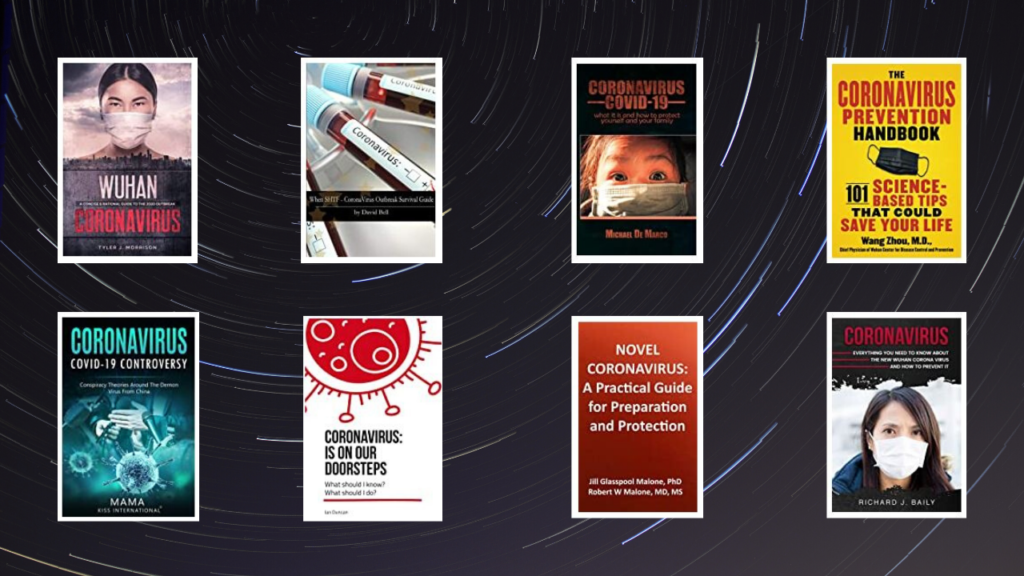
With the outbreak of coronavirus (COVID-19), it’s not surprising to see that several authors have jumped in to write books about the disease.
I was curious to find out how many books were already published, so I searched Amazon for the “coronavirus” keyword under the books category and got 947 results.
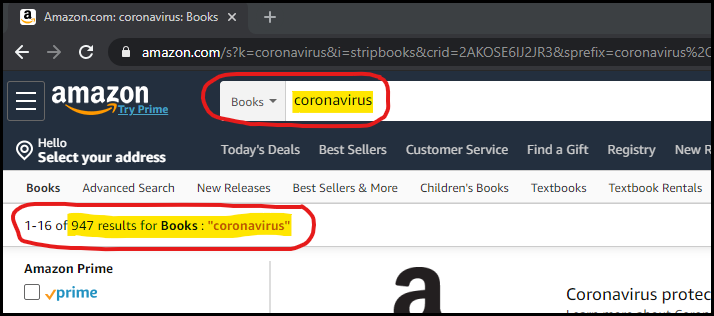
This doesn’t necessarily mean that there are 947 books about coronavirus.
What it means is that there are 947 books that mention the word coronavirus in the title, subtitle, description, or any of the keywords.
To find out a bit more, I filtered through the search results and it turns out that 658 results were listed as “New Releases” published in the last 90 days, and 489 results were published in the last 30 days.
In other words, the majority of the book results seem like they are related to the 2019/ 2020 outbreak, which confirms that there’s a flood of authors writing about the topic.
Based on my analysis, some of those authors are making upwards of $300 a day from writing those books. However, it also looks like Amazon is banning some of them because of the reasons I mention below.
Given that there are no signs of coronavirus slowing down, I’m pretty sure that there will be a lot more books published about the disease in the next few weeks and months.
Before I get into the tips about how not to write a book about coronavirus (or any other hot topic for that matter), I do want to say up-front that I don’t think there’s anything wrong with jumping on a trendy topic to share some helpful information (I genuinely don’t judge anyone for doing so, and more power to anyone if they think they can write a good book).
However, there’s a right way and a wrong way (or at the very least, a very shady way) in which you can approach writing a book. And this is especially true when it’s about a sensitive topic affecting people’s health.
Here are a few tips about how not to write a book about the coronavirus.
1) Don’t Use Questionable Coronavirus References
Let’s start with the most important (and obvious) fact. If your book is about anything related to healthcare, you want to make sure you use references that are fairly reputable.
Information from institutions such as the CDC and WHO are obviously more reliable sources about coronavirus than an unknown blogger looking for some clickbait.
On that note, if your book is based purely on your opinion as a medical professional, and not on any facts, then you need to state that very clearly in the book. You also need to list out any disclaimers because you could be held legally responsible for any misinformation you spread.
Also, and this goes without saying, make sure that you don’t plagiarize any of those references. While it’s okay to copy/ paste a sentence or two from those sources (and giving them appropriate credit), copying entire paragraphs from articles and claiming that they’re yours is considered plagiarism and is going to hurt you legally & financially.
In any case, as you write your book, you should provide some additional context by adding some valuable information from your own perspective, and not just pass along information you simply read online.
For example, one common recommendation to avoid the spread of coronavirus is to “wash your hands and avoid touching your face.” Instead of simply restating that fact, a good idea as an author would be to give you readers some hacks to help them remember doing so.
That’s because your readers can easily see through a lousy copy/paste job and will publicly shame you in the reviews.
Here are a few examples of reviewers about a book called WUHAN CORONAVIRUS SAFETY GUIDE: A Detailed Survival Manual to the China 2020 Novel Coronavirus (COVID & nCoV) Outbreak
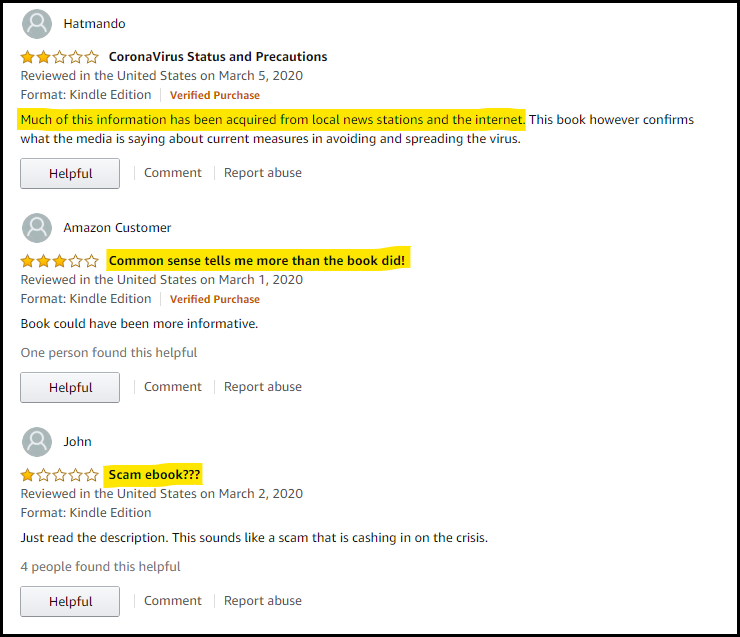
2) Don’t Use a Pen Name
A pen name is a pseudonym that some authors use to avoid using their real names. There’s nothing wrong with using pen names (I use a slight variation of my name to keep my business and travel book profiles separate).
However, when it comes to a healthcare-related topic, people want to know who they’re getting their information from.
They want to trust that you’re a qualified professional who has some experience with the topic. And if you use a fake name, your book will be perceived as fishy.
Another tip is to list your qualifications (and preferably, a picture of yourself) on your Amazon author profile to help give prospective readers a sense of who you are.
Here are a couple of examples.
Example 1 of a Coronavirus Author using their Real Name
The first example is of Jill Glasspool Malone, PhD, who co-authored a book called Novel Coronavirus: A Practical Guide for Preparation and Protection with Robert Malone and used her real name.
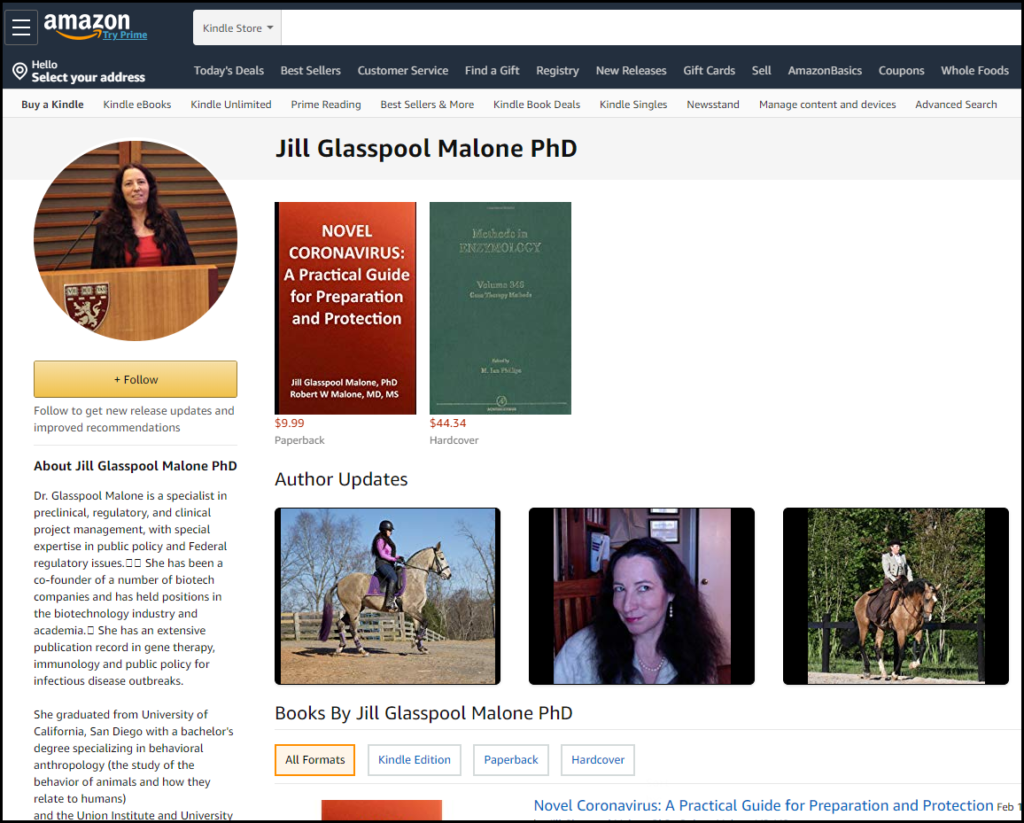
Jill holds several degrees and graduated from the post-doctoral Harvard Medical School Global Clinical Scholars program. She co-founded a number of biotech companies and published another book about Gene Therapy Methods.
A quick Google search shows that she is a real person and has a legitimate LinkedIn profile.
On her Amazon author profile page, she published an authentic biography and posted a few pictures as well.
Example 2 of a Coronavirus Author using a Pen Name
The second example is of Tyler J. Morrison, who authored a book called Wuhan Coronavirus: A Concise & Rational Guide to the 2020 Outbreak (COVID-19) under a pen name.
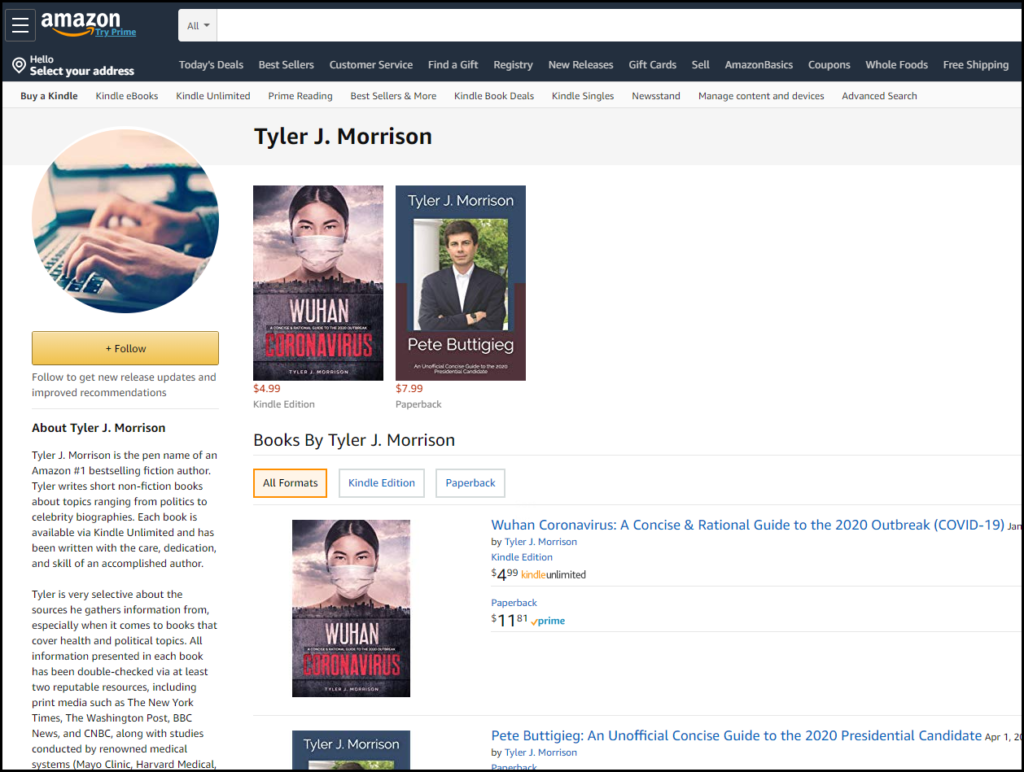
Tyler’s Amazon author profile explains that he’s an Amazon #1 bestselling fiction author. The next sentence states that he writes non-fiction books (so I’m not sure if the latter is a typo or if he actually publishes both fiction and nonfiction books).
His profile goes on to state that he is “very selective about the sources he gathers information from” and that information “has been double-checked via at least two reputable resources.”
His author page also shows that he has published another book about Pete Buttigieg (not related to healthcare).
The picture he used looks like it’s a generic stock photo of someone typing on a keyboard.
All of those are red flags that would make someone think twice about buying his book.
It very well might be that the real person behind the Tyler pen name has the right intentions (and valid reasons behind not using their real name).
However, most readers would probably be more comfortable reading a book by someone like Jill who published under her real credentials than by Tyler who didn’t.
So keep that in mind when you write your own book.
3) Don’t Write a Bad Book
Finally, and I know this sounds super-obvious, please don’t write a book that you’re not proud of.
I’ve discussed why an author’s brand is way more important than the money they make and talked about the importance of using Rule #1 as a North Star.
Anyone can put together a few sloppy pages, call them a book, and post them on Amazon to make a couple of bucks.
However, this is not a strategy that works in the long run.
Here’s an example that explains why.
One of the top results I got when started searching for coronavirus books was the following title: Everything about face MASKS and Coronavirus (Covid-19): Simple guidelines to protect yourself
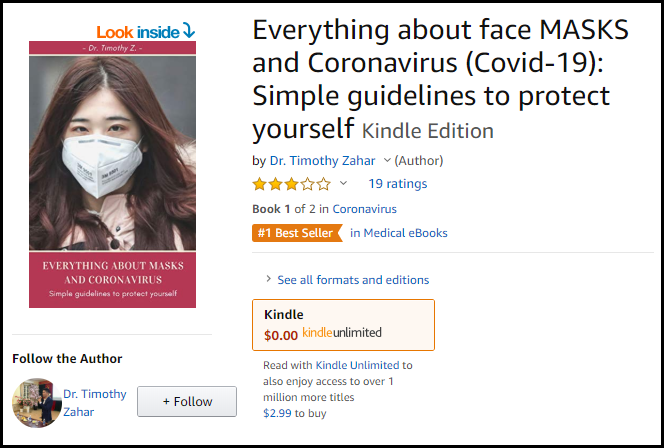
As you can see from the screenshot, it’s listed as an Amazon #1 Best Seller.
When I scrolled down to at the book’s Amazon Best Sellers Rank (ABSR), it showed up as #616 in the paid Kindle Store (and #1 in the Medical eBooks category).
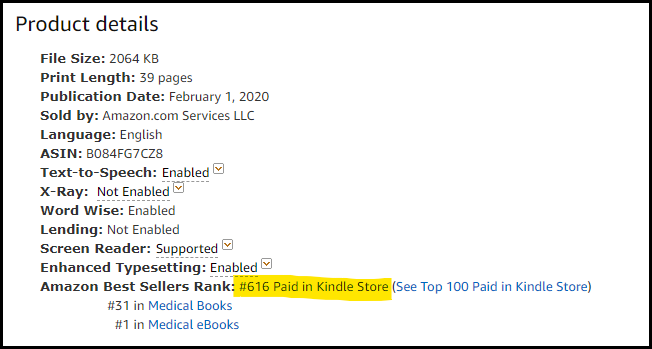
This is quite impressive, and according to Kindlepreneur’s Amazon Sales Rank calculator, an ABSR of 616 translates to around 149 sales per day.
The Kindle book is at a $2.99 price point, and with a 70% (or $2.09) royalty, this translates to around $311 per day in profit (or around $9,330 per month) assuming it maintains that ranking.
Not too bad for a single ebook.
However, the reviews were not too generous. Here’s a sample:
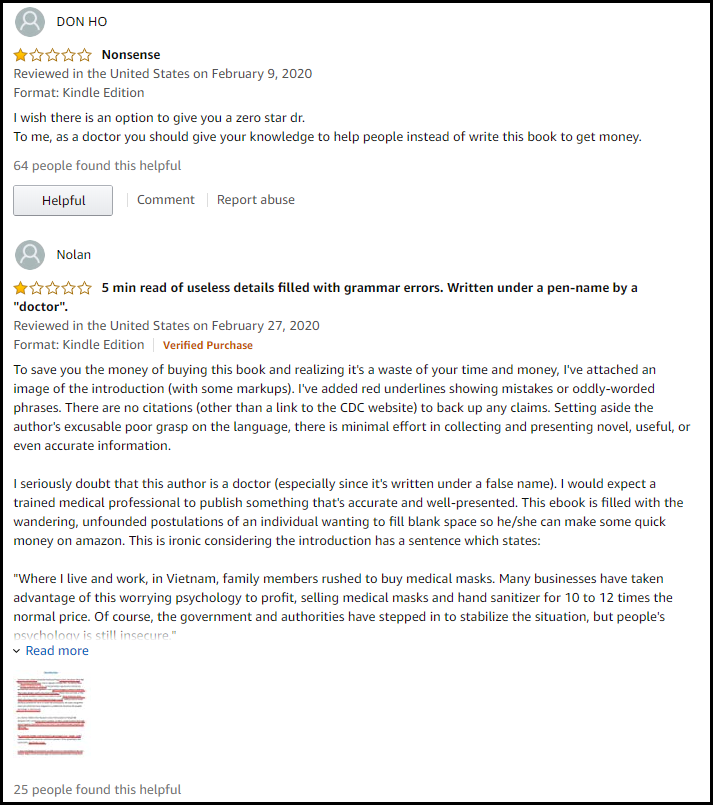
And here are a few more:
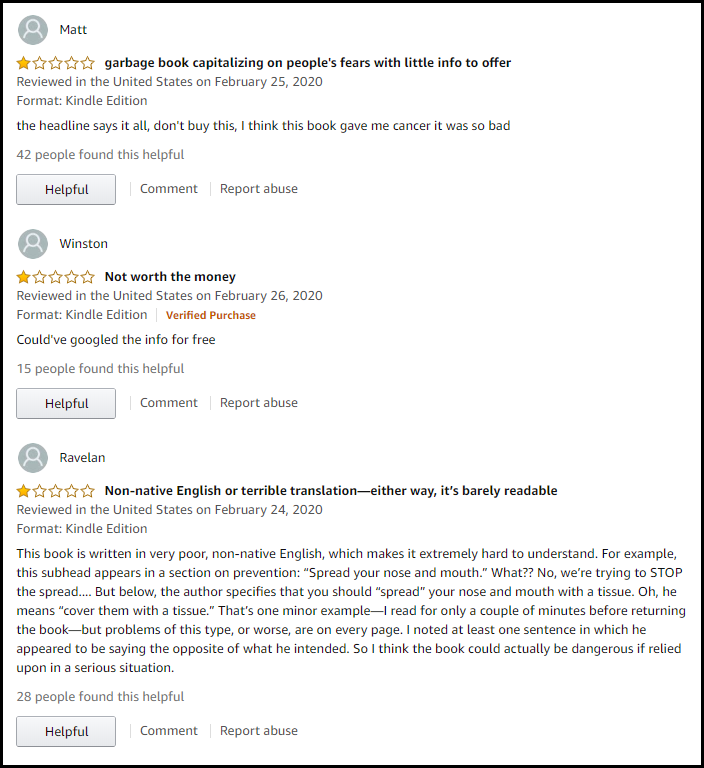
Ouch.
The author is listed as Dr. Timothy Zahar (also a pen name), and here’s a screenshot of his author profile that explains he’s a doctor in Vietnam:
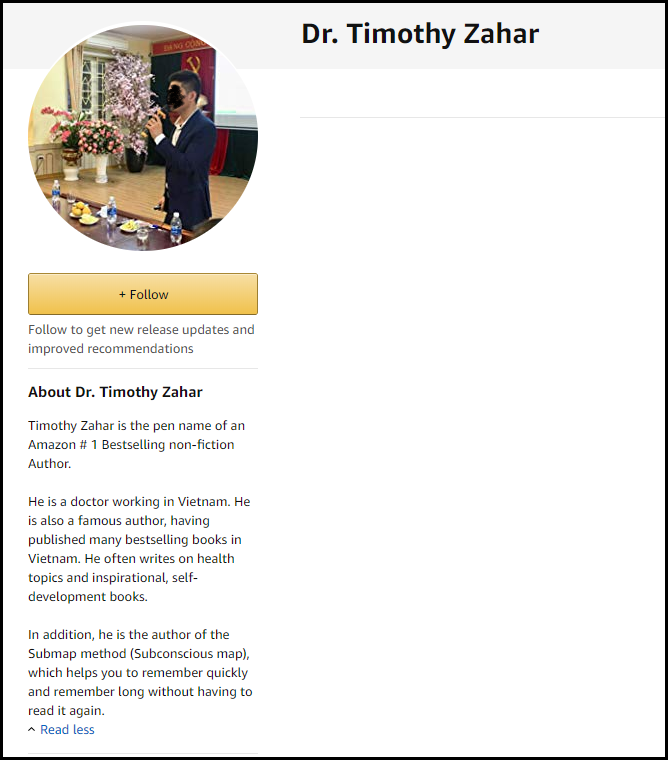
I masked his face because I’m not sure if he just pulled a random picture from someone else’s profile given that he confirmed this is a pen name.
As a prospective author, you might question why you should care about negative reviews or taking a hit on a fake pen name if the book is a best seller making over $9,000 a month.
As I was preparing to write an argument for why I think that’s still a bad idea, Amazon made the case for me.
It turns out the negative reviews were apparently so bad (or maybe that the book sounded so shady), that when I checked it out this morning right before I published this post (to test the link to the book), this is what showed up:
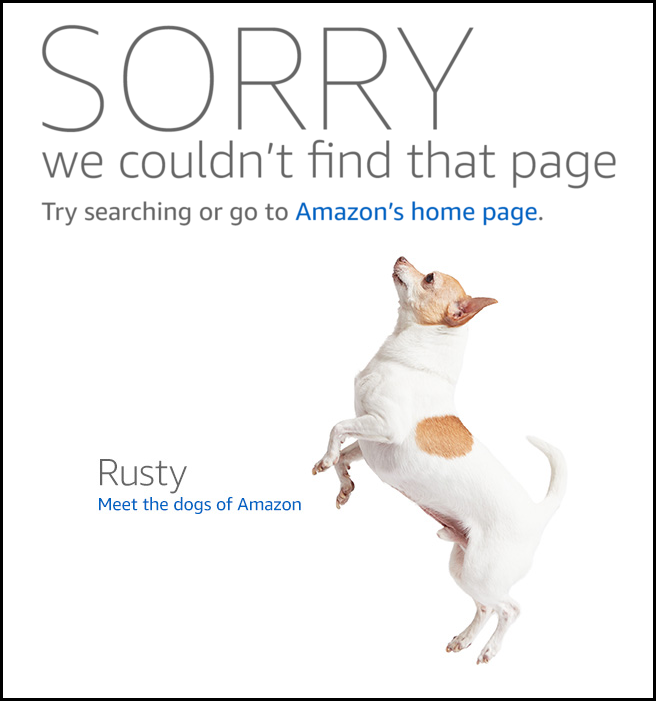
So it looks like Amazon pulled the book off their shelves.
I’m guessing that the author was given a stern warning by Amazon’s KDP team, and (assuming he violated their policies), was probably banned from publishing any future books on the KDP platform.
I don’t think anyone would think this is worth the trouble, and I hope that if you’re considering writing a book about coronavirus, that you keep all the above in perspective (and follow the 15-word rule).
Update on April 1, 2020: I’m writing a book, documenting the journey, and donating profits to COVID-19 efforts. Click here if you’d like to follow along.